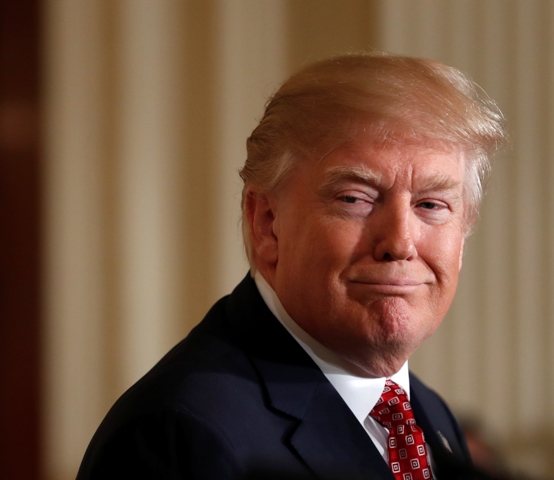A shift in US policy? A White House official said the US will not force a two-state solution on Israel.
The Trump administration suggested Tuesday that peace between Israel and the Palestinians does not have to come in the form of a two-state solution — a position that could represent a dramatic shift from what has been US policy for more than 20 years.
Speaking to reporters ahead of President Donald Trump’s meeting Wednesday with Prime Minister Benjamin Netanyahu, a senior White House official said Trump is eager to begin facilitating a peace deal between the two sides, hoping to bring them together soon.
But the official, who was not authorized to speak publicly on the meeting beforehand, said it will be up to the Israelis and Palestinians to determine exactly what peace would entail — and that peace, not necessarily in the form of a two-state solution, is the goal.
“Peace is the goal, whether that comes in the form of a two-state solution if that’s what the parties want, or something else if that’s what the parties want,” he said. “A two-state solution that doesn’t bring peace is not a goal that anybody wants to achieve.”
For decades, the US position has been that Israelis and Palestinians must work through direct negotiations to establish two states living side by side. All negotiations until now have assumed that the two-state solution was the basis for future peace.
State Department officials on Tuesday expressed surprise at the comments, saying they were unaware of any policy shift in this regard. Three officials, also speaking on condition of anonymity, said the Department was seeking clarification on the White House’s comments, which came as Secretary of State Rex Tillerson was having dinner with Netanyahu.
It was not clear if the White House had intended to declare a major shift in policy during the briefing Tuesday night.
Netanyahu is scheduled to meet with Trump at the White House Wednesday. The two leaders will hold a joint press conference before convening for meetings and a working lunch. Netanyahu will then head to Capitol Hill for meetings with lawmakers on both sides of the aisle, including Senate Majority Leader Mitch McConnell, House Speaker Paul Ryan and Senate Minority Leader Chuck Schumer.
Seeking a Closer Israel-US Relationship
Trump said during the presidential election campaign that he would love the challenge of negotiating a Mideast agreement. He appointed his son-in-law, Jared Kushner, to lead the effort.
An official said the visit was meant to mark a new, closer relationship between Israel and the United States, which grew strained during the Obama years.
Trump and Netanyahu are likely to discuss peace efforts as well as Israeli presence in Judea and Samaria, the Iranian threat and Trump’s campaign pledge to move the US embassy in Israel from Tel Aviv to Jerusalem.
The latter would signal US recognition of Jerusalem as Israel’s capital, a move that would infuriate the Palestinians.
Trump told the Associated Press during his campaign that he wanted to be “very neutral” and try to get both sides together. His tone became more pro-Israel as the campaign progressed.
Now in office, Trump appears to have reevaluated and revisited his position on issues relating to Israel.
After initially greeting Israel’s announcements on construction in Judea and Samaria with silence, he seems to be having second thoughts. In an interview with daily Israel Hayom on Friday, Trump said, “I am not somebody that believes that going forward with these settlements is a good thing for peace.”
Ahead of the visit, Netanyahu said he would handle ties with the US in a “prudent manner,” adding that he and Trump see eye-to-eye on many issues.
The Israeli prime minister is also scheduled to have breakfast Thursday with Vice President Mike Pence before returning to Israel.
By: AP and World Israel News Staff


